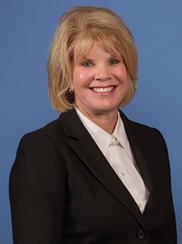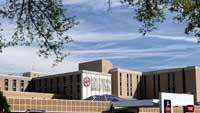The CEO of Southern Regional Medical Center has her hands full.
The financially ailing hospital in Riverdale, in south metro Atlanta, has seen high levels of uncompensated care and a decrease in privately insured patients, among other negative payment trends.
Last year, a $50 million Clayton County bailout helped Southern Regional Medical Center step back from a financial cliff.
This week, facing continuing challenges, Southern Regional CEO Kim Ryan announced job cuts.
“We have made a commitment to increase efficiencies and reduce costs,” Ryan said in a statement. “Unfortunately, these measures required an organizational restructuring and the elimination of 80 positions, including management positions, throughout the health system.”
Ryan has met with county and community leaders over the past few weeks in an effort to obtain additional financial support, the hospital said.
Similar financial pain has spread across the Georgia hospital industry, from rural facilities to urban systems.
Since the beginning of 2013, five hospitals in the state have closed, and four of those were in rural areas, where patients often have no easily accessible alternatives. On the urban side, two Columbus hospitals have announced moves to counter financial pressure.
Southern Regional is located in a county with both a high rate of uninsured residents and a high poverty rate — factors that end up eroding the hospital’s bottom line.
Chris Kane, a consultant for Dixon Hughes Goodman, told GHN on Thursday that the hospital may need more county financial help to buy time until it can become more attractive for a buyer.
“County support is the best way to ensure they stay around long enough,’’ Kane said.
The state expanding its Medicaid program under the Affordable Care Act would also help, he said.
Hospital official Claudia Hall told GHN in an email Thursday, “While we respect the Legislature’s decision to forgo the expansion of Medicaid, our community and our hospital would benefit from coverage expansion of some type.’’
Medicaid expansion was originally blocked by Gov. Nathan Deal, who says it would be too costly for the state. Last year, the General Assembly, reinforcing his position, passed a law barring any future expansion without legislative approval.
The AJC’s Tammy Joyner reported recently that the bailout that taxpayers approved last May relieved Southern Regional of about $42 million in bond debt, paid to replace its chiller unit and provided a one-time payment of $7.4 million to help cover some costs for the poor. In return, the hospital cut expenses by $12 million, hired new leadership and sold off some properties.
Southern Regional also received a boost through its association with Emory Healthcare, which has negotiated a better deal with insurers and helped the Clayton County facility attract some doctors, the newspaper reported.
Yet the hospital’s cost of delivering uncompensated care is about $21 million annually, Hall said.
Other numbers show the stark challenge. Southern Regional’s bad debt expenses nearly tripled between 2004 and 2012, to more than $50 million a year, the AJC reported. And between 2007 and 2012, Southern Regional reported more than a 50 percent drop in admissions covered by third-party payers, such as private insurance.
Ryan said in a press release Wednesday, “Hospitals nationwide, including many in Georgia, are struggling with loss of patient volume, reimbursement reductions, new regulations and reform uncertainties,” she added
The primary drivers behind the hospital’s operating deficits are an increase in uncompensated care and Medicaid; a decrease in managed care volume; declines in patient care volume overall, especially surgical volumes; and a reduction in federal and state funding, the hospital said.
“In making decisions on organizational changes, we considered the importance of maintaining
facilities, safety and quality of care priorities,’’ Ryan said. “Of course, we would prefer to not be in the financial position we are in, and that’s why we’re also putting a focus on restoring revenues from patient care volume.”
Kane said hospitals such as Southern Regional face increasing competition for outpatient services from surgery and imaging centers.
He predicted that in this tough financial climate, some urban hospitals will end up closing.
Hospital CEOs, Kane said, face greater strategic, operational and financial challenges than ever before.
“Only the adaptable will survive,’’ he said.


